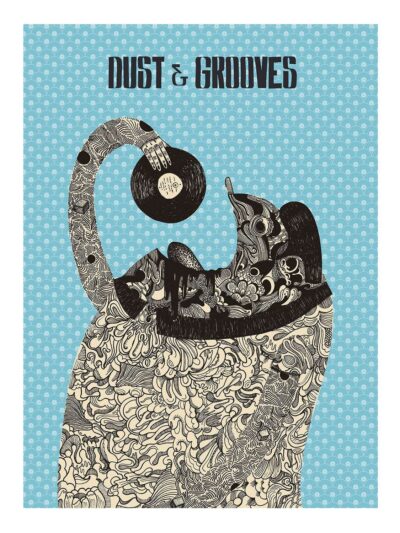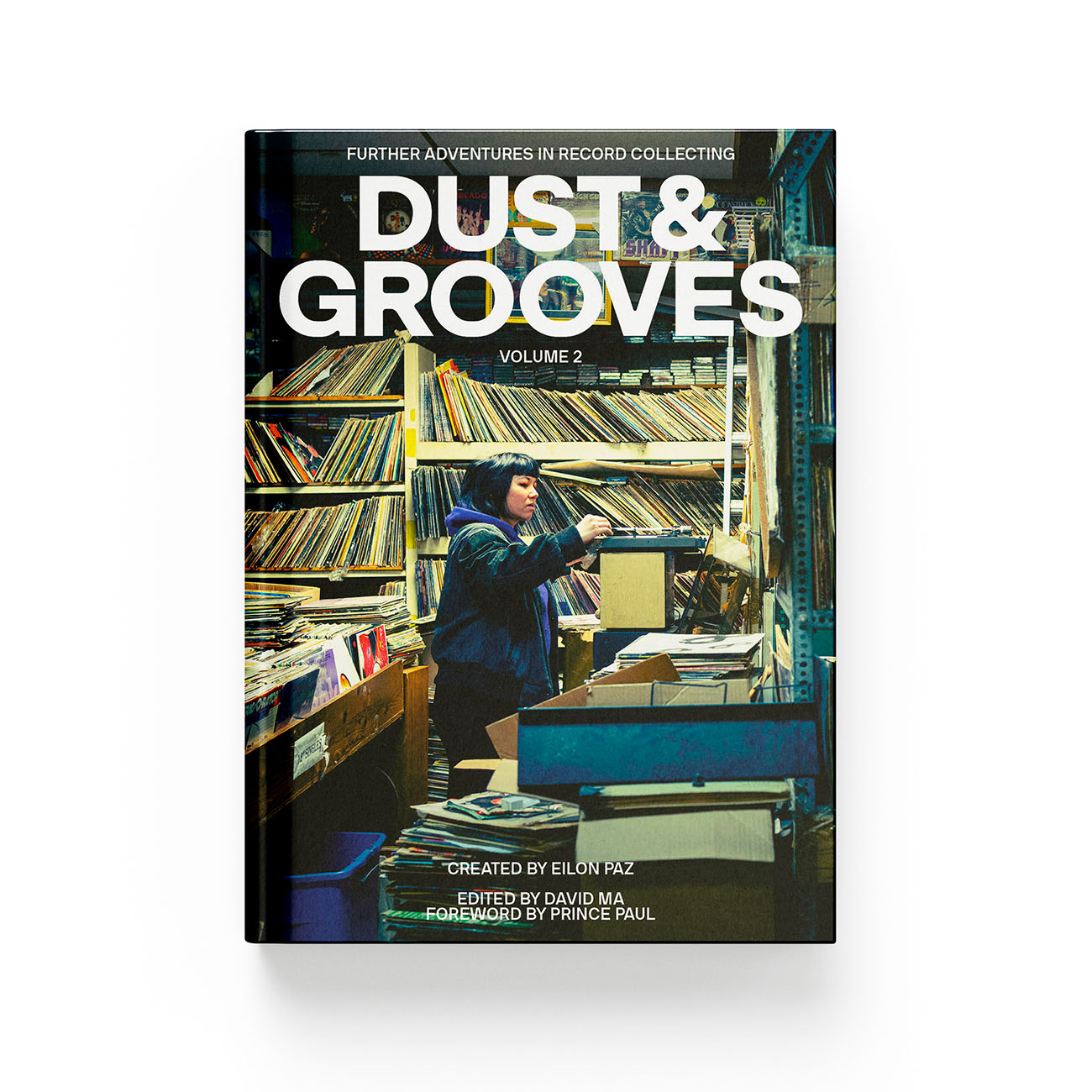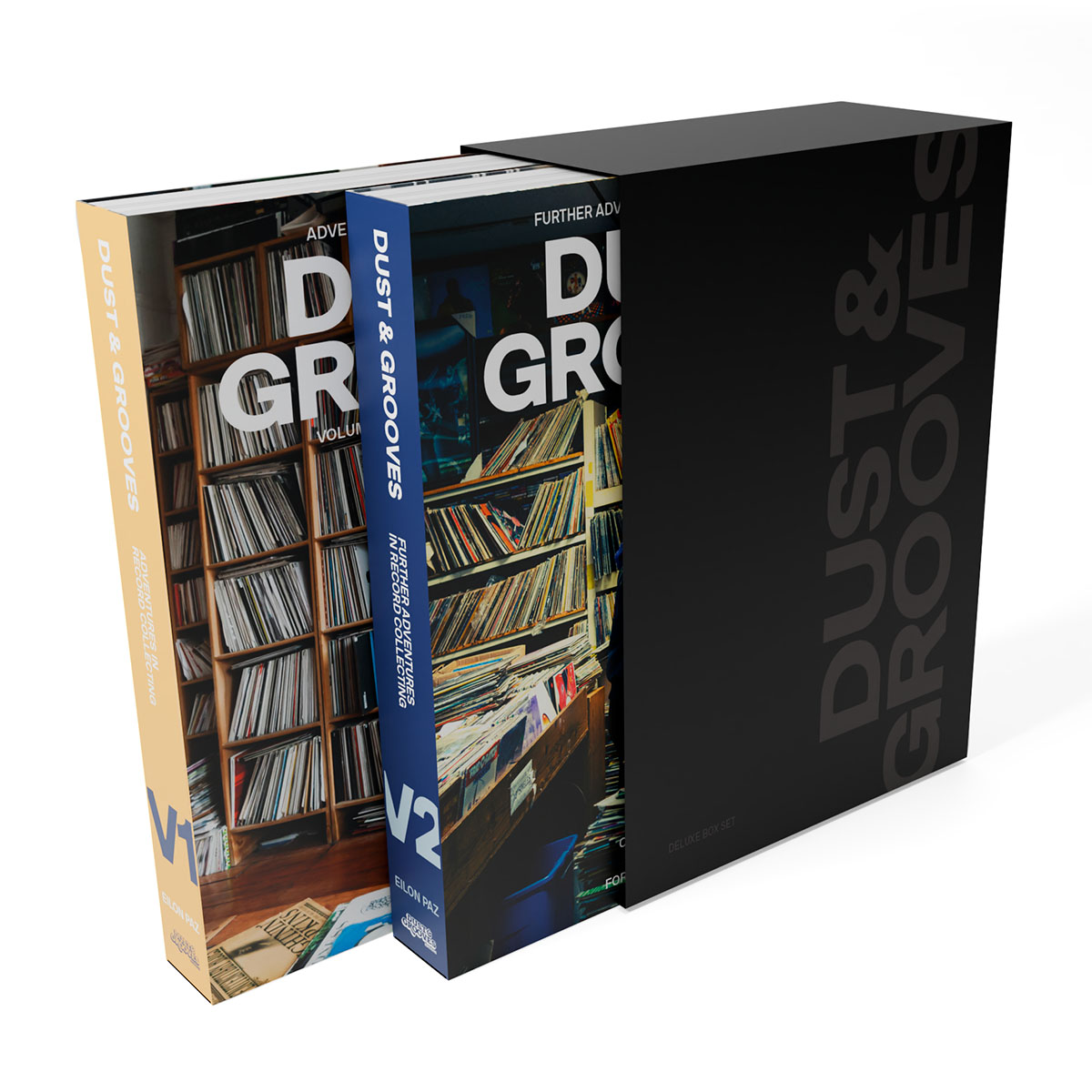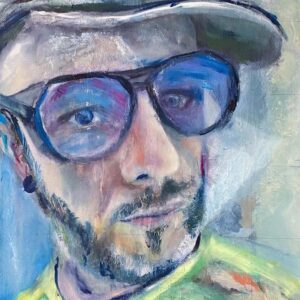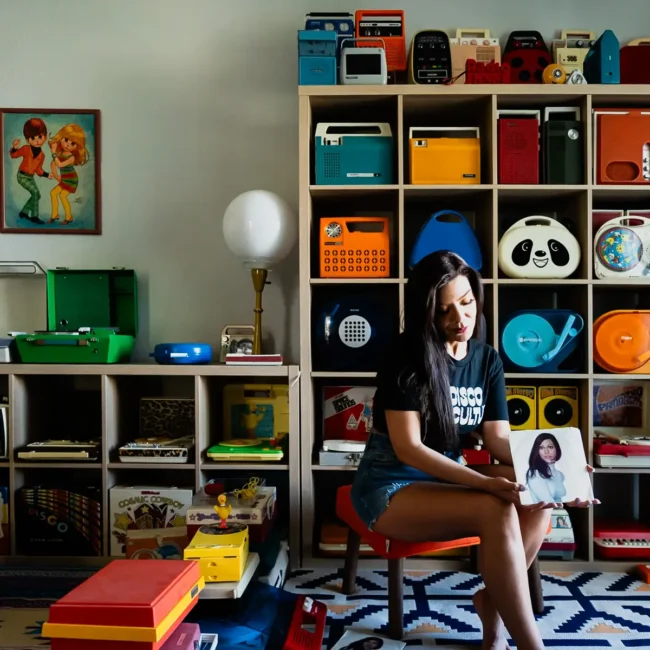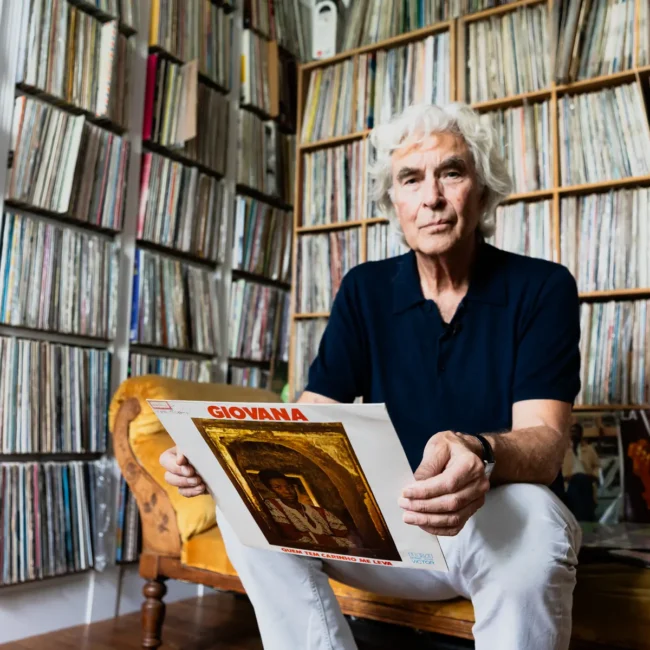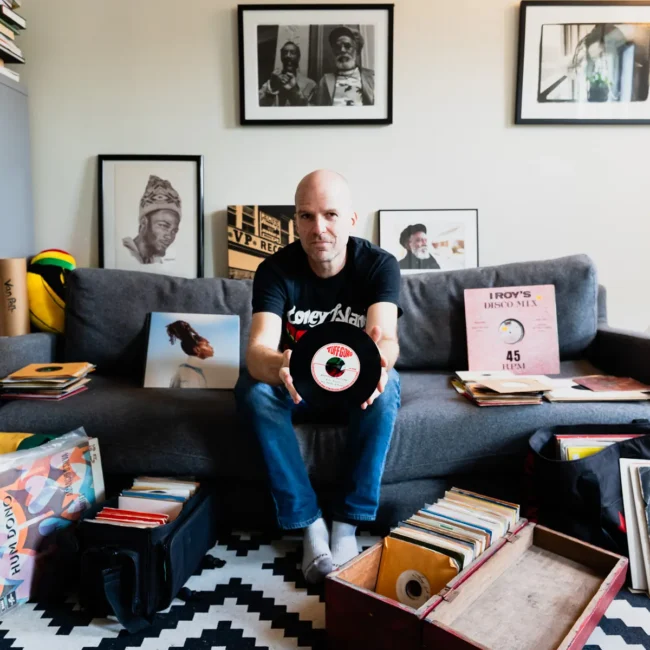Gustavo Aquino never looks anything less than perfectly put-together, always exuding an effortless Carioca cool and a sartorial panache that honors his Afro-Brazilian heritage with a distinctly modernist twist. His style is a visual metaphor for his approach to record collecting: a deep respect for Afro-Brazilian music’s history and culture combined with a perpetual desire to push things forward. The colorful beads he wears around his neck highlight his roots from the Umbanda religion while speaking to his unique philosophy on digging: “The blue beads are from Ogum, and the red and white ones are for Xango…all the music that I’m trying to find needs to have this kind of relationship with the orixás who guide my head.” he explains. “When I find a record whose chorus sings of ‘Xango,’ I feel instantly connected.”
Whether he’s carving out his niche in search of long-overlooked records or redefining what a DJ set can encompass, Gustavo is a law unto himself. His warmth, charisma, and humility are only matched by his astute intellect and fierce self-determination. I jumped at the chance when I was offered the opportunity to sit down and speak with this Rio de Janeiro-based collector. While I had long admired and respected Gustavo, there was still much that I was eager to learn about his personal story and ethnomusicological approach to digging.
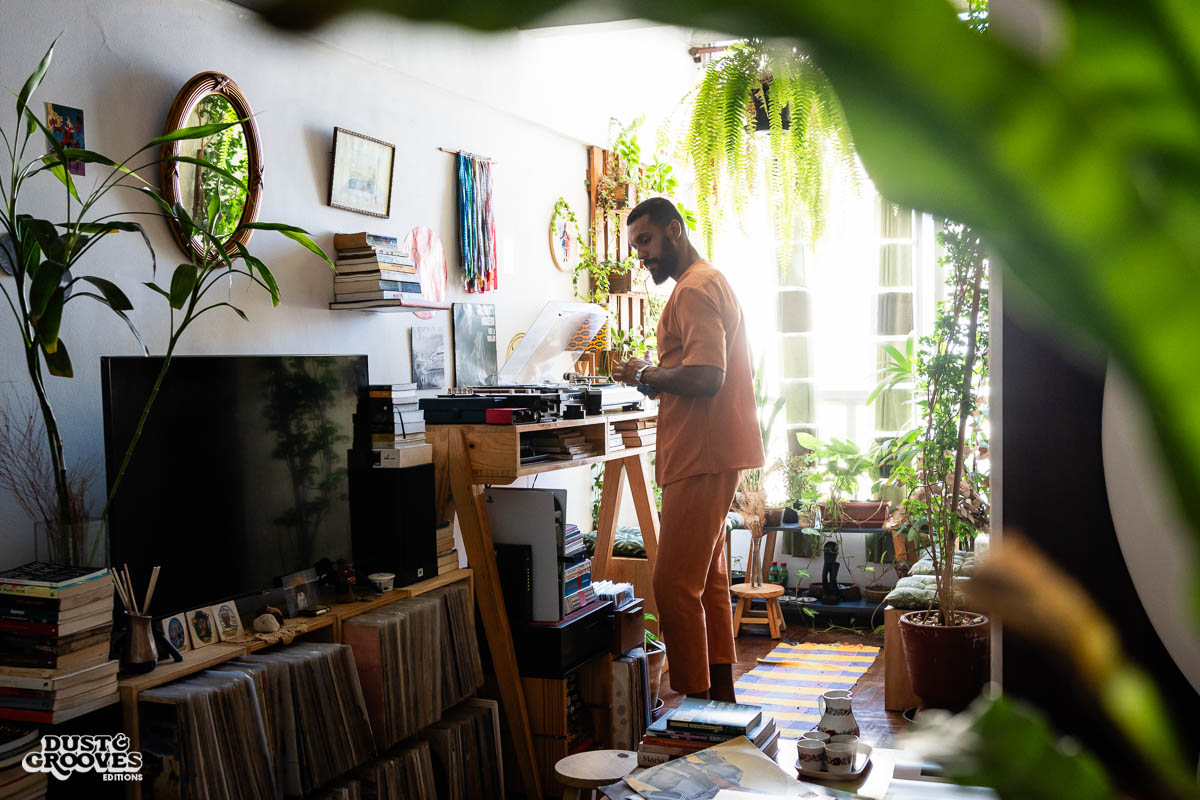
"Since I was a kid my father always told me, ‘Gustavo, if you hold a book, no one will beat you. The cops will not harass you if they think you are a student’… A book, for me, is more than culture. It is an amulet.”
Gustavo Aquino Tweet
Gustavo, maybe you can start by just telling us a little about your background.
I am originally from São Paulo. I am 35 years old. I graduated with a degree in history, and my whole adult life I’ve worked as a researcher and historian in museums. This is basically my background. I came to Rio de Janeiro to work in this museum called Instituto Moreira Salles.
What kind of museum is that?
The museum specializes in colonial art and photography, mainly focused on the 19th century.
Is there a connection between your work at the museum and your record collecting?
Not directly, you know, but indirectly, probably yes. The whole day, looking at all these images from the colonial period inspired me to discover more about Black culture and the different kinds of African people who came to Brazil. So it inspired me in this way, you know, because you see the image and you think, “Oh, wow, this is interesting.”
Let’s back up a bit to São Paolo. Were you born in the capital?
I was born in the suburbs of the city of São Paulo in the South Zone, a place called Campo Limpo. Back in the ‘80s and ‘90s, Campo Limpo was really… how can I describe it? It was really dangerous to be a Black person there because, in the South Zone back in the day, it was really violent. And a lot of rap music came from the South Zone, like Racionais MCs, like MRN… really important groups who used to write about the social struggle there. So I came from Campo Limpo. My whole family still lives there.
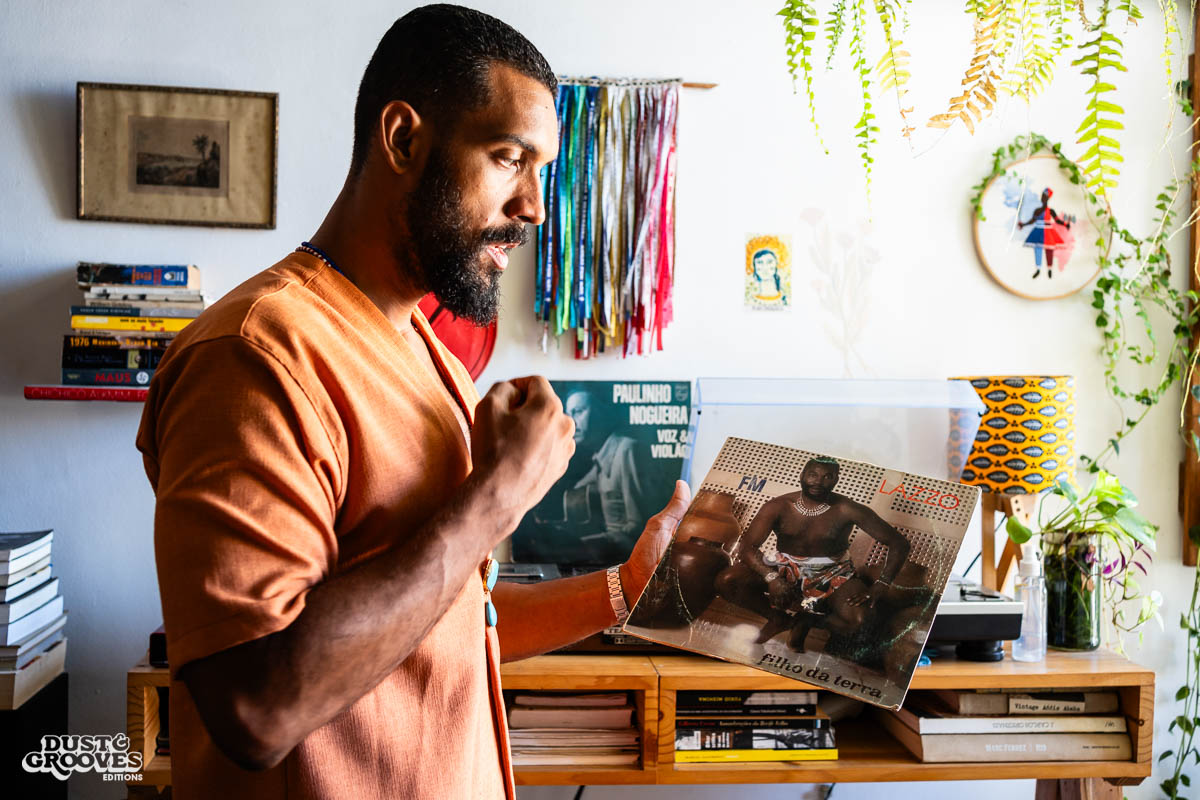
As a kid, is that what you would have been listening to? Groups like Racionais? Was there music in your home that was influential?
Basically, the music that surrounded me growing up in Campo Limpo was samba… a lot of samba. Also, I have an older brother and sister, and they used to listen to a lot of rap. Brazilian rap. So things like Racionais… things like Facção Central. Really heavy stuff. You know, because all those lyrics, mainly the lyrics, were important because they used to rhyme about the social struggle, the slavery. Also, there was a group… a really, really mellow group called Sampa Crew. Nowadays it’s really trendy but back in the day they were really important to me for a different reason. I was a little bit ashamed of being into them at the time because Sampa Crew used to talk about love, you know? Nowadays, everyone’s like, “Oh my god, this is amazing!”. But back in the day, I didn’t have the clarity or awareness to see how precious this was…
You had to put up a tough front. You couldn’t appear vulnerable in your surroundings.
Yeah, people in my ’hood, we needed to appear strong, you know? Like, closed face, always showing our gangsta style, right? And then, when I got older, I saw, “Wow, this is amazing. This is fascinating.”
Besides Sampa Crew, was there any influence, musical or otherwise, that helped you embrace this softer side or made you realize it was okay just to be who you are?
Definitely, I always say pagode music taught the favela, the suburbs, to talk about love. You know, pagode was crucial. Because back in the ‘90s, we had hip-hop showing the struggle, rhyming about the violence. But then came pagode, and pagode gave Black folks the possibility to talk about love in the ’hood, you know? So, I think for me pagode was a really important movement that we need to dig more. I know that it was super trendy, but there are also some really obscure groups who had good songs, a strong influence from hip-hop as well. Sampa Crew, in my view, was the middle ground between real hip-hop and the beginning of pagode. So basically, that.
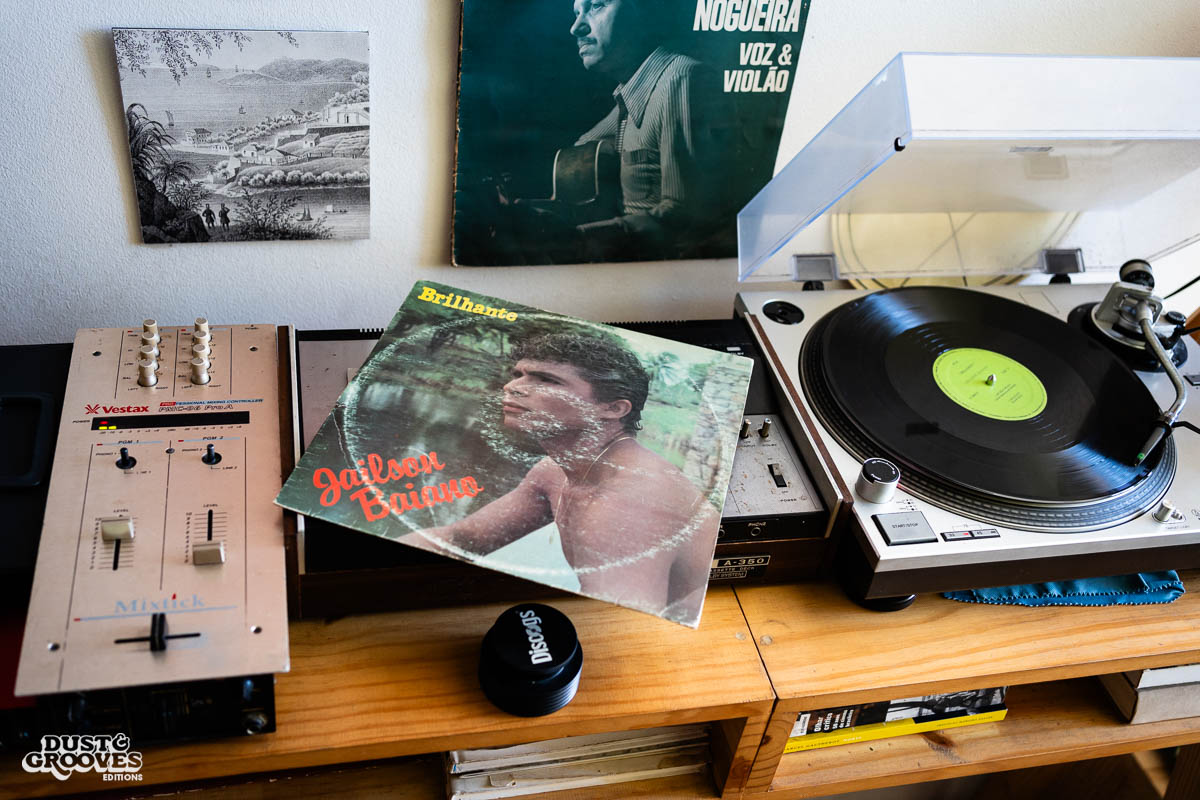
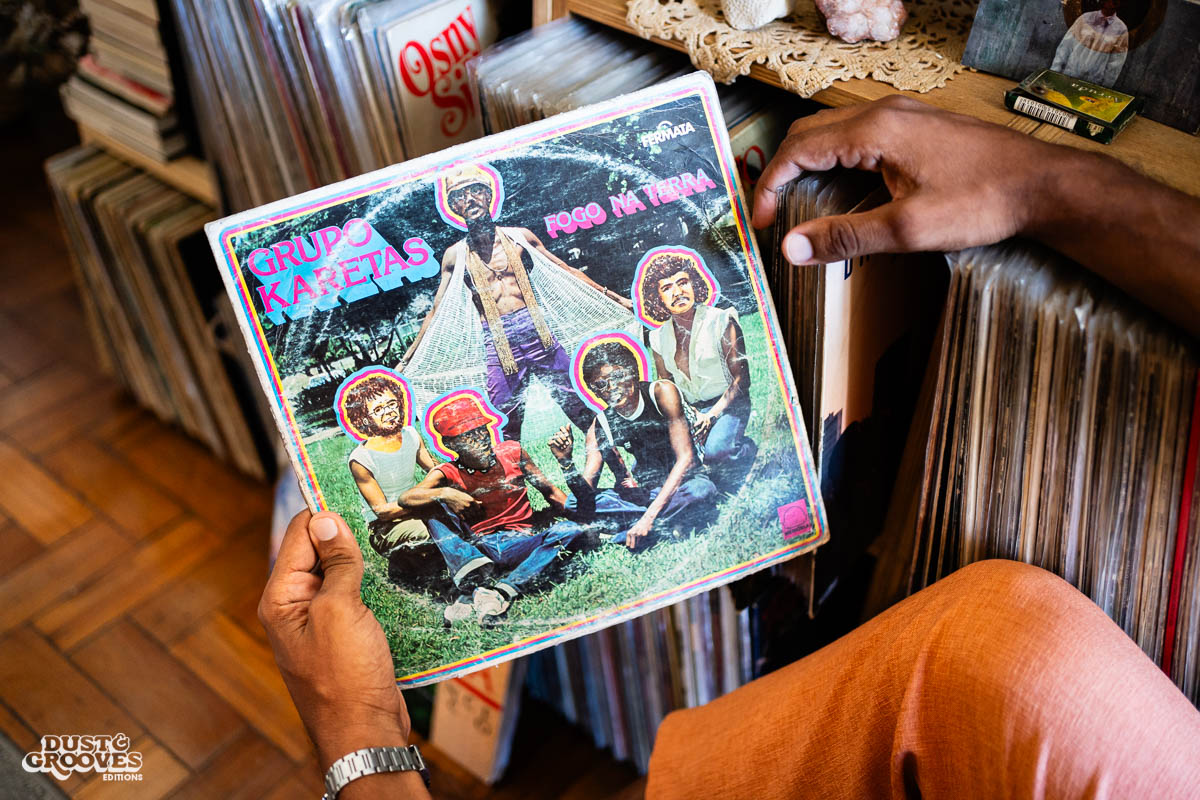
Let’s talk about your entry into the vinyl world and the route that led you to start collecting and, eventually, DJing and selling records.
Vinyl was always present in my life because, back in the day, it was cheap to buy, right? My parents used to collect a lot of records. When the CD came, everyone tossed everything. So much vinyl went into the trash as folks began to buy CDs. But CDs were more expensive than records. So, in the ’hood, some families who didn’t have the financial means to switch to CDs continued to collect vinyl. That was the case with my family. When I came to Rio, I brought some stuff from my home, you know, some records and things. And then I began to collect for myself. My father used to have his collection of some disco stuff from the US. Motown music was really, really important for him. But my father is from Salvador, Bahia. When I began to live alone, I missed my father, you know, so I began to collect things from Bahia to remind me of him. Bahia became the main focus of my collection. I was buying some famous Bahian artists like Caetano Veloso and Gilberto Gil, but then I also began to collect more obscure stuff like Batatinha, Ederaldo Gentil. Some artists became important to me because of their relationship to the Afro diaspora… because of their lyrics. The lyrics, more than the beat, are important to me. I like lyrics that put the social struggle in evidence. This is a school of thought that came with me from hip-hop.
When I first discovered you, I really loved that you were pushing a sound that seemed worlds away from the Brazilian records that most collectors were chasing at the time—the Umbanda and Candomblé records… to axé and carimbó music. Can you tell me more about your taste right now and what types of records you’re most excited to find?
Yeah, I’m always excited to find records that mainly came from obscure Black artists from the North and Northeast of my country… I just want to say that I am not from the North or Northeast of the country, and I know there are a lot of good diggers there, good researchers there, but they don’t have the same opportunity to show their work. I know that I have the privilege to be a guy who was born in São Paulo, who lives in Rio, and plays stuff from the North and Northeast of the country. I’m fully aware of this, and I just want to say that I really respect all those diggers. But back to the question, my main focus is Black artists whose lyrics remind us of the Afro-diaspora, because in Brazil, mainly in Bahia, many African people came from Benin, from the old kingdoms of the Yoruba. Through these people that came here, you can see the influence in the music over the decades, like how in some beats of agogô, some chants that are used in the ceremony of Candomblé, how the younger generations used this in their music in the ‘80s and ‘90s. This is fascinating to me, how this unique genre of axé and ijexá has this blend that unifies the sacred and the profane. I don’t know any other genre on the whole planet that has this blend. I can give you an example of this group called Banda Terceiro Mundo. They put original chants sung in the ceremonies of Candomblé with synthesizers and guitars, and they created something new, you know? So this, for me, is my main focus: obscure Black artists from the ‘80s and ‘90s, mainly from the North and Northeast of the country, whose lyrics praise this Afro-Diaspora universe.
I love this idea of mixing the sacred and profane, as you put it. I’ve never heard it done as well anywhere else, this fusing of traditional spiritual themes with music that makes you want to get down.
Right now, I’m talking a lot with a guy called Adrian Loving from Washington, DC, a researcher and writer, and we are discussing the similarity between this concept of the sacred and profane in axé music with some gospel in the US. It’s all related because it came through the Afro-Diaspora. It’s all connected.
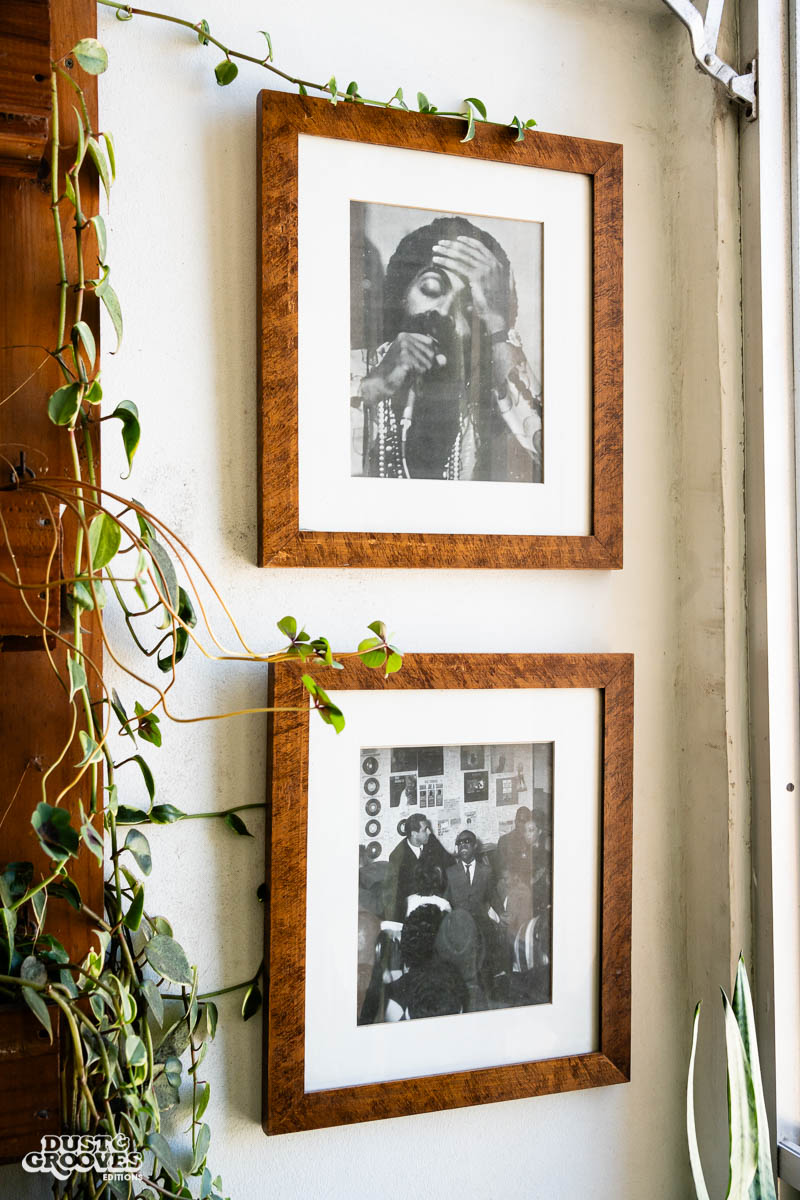
“Salvador is my place of power. It’s where I recharge myself. Although I was born in São Paulo, my whole family originally came from Salvador, and I’ve come to call it my home.”
Gustavo Aquino Tweet
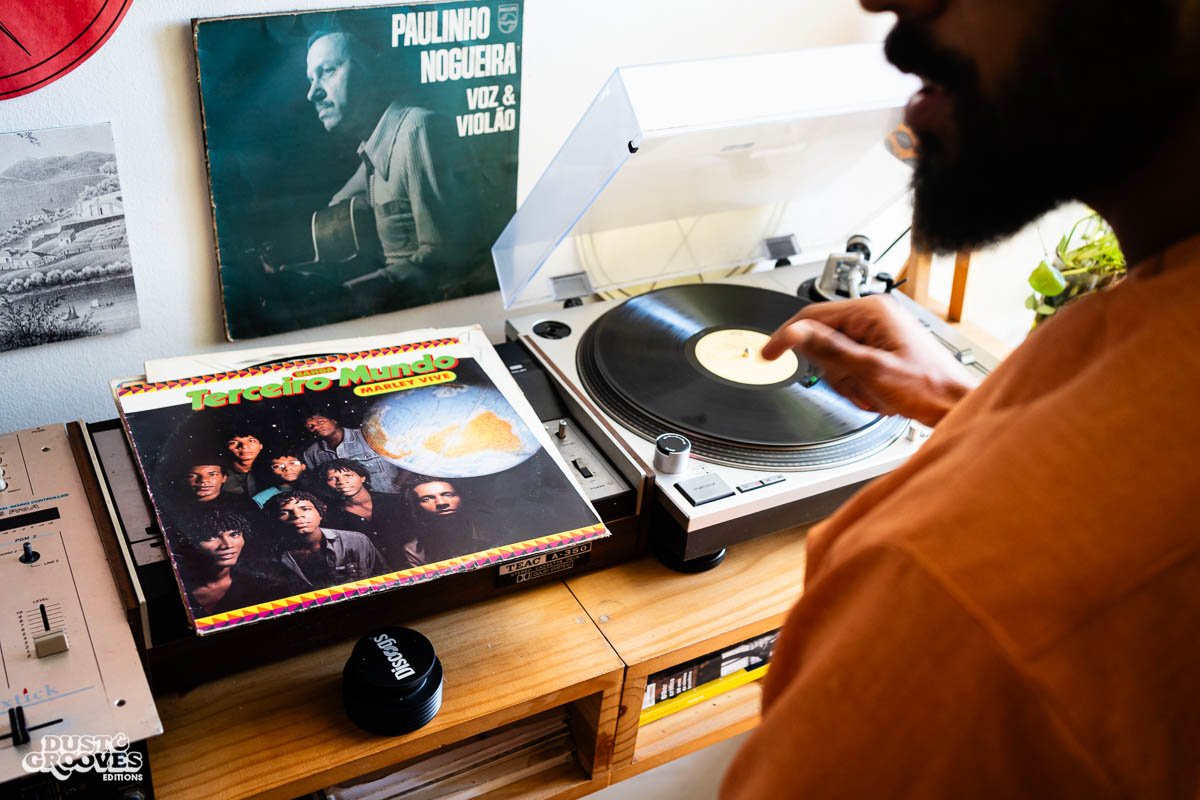
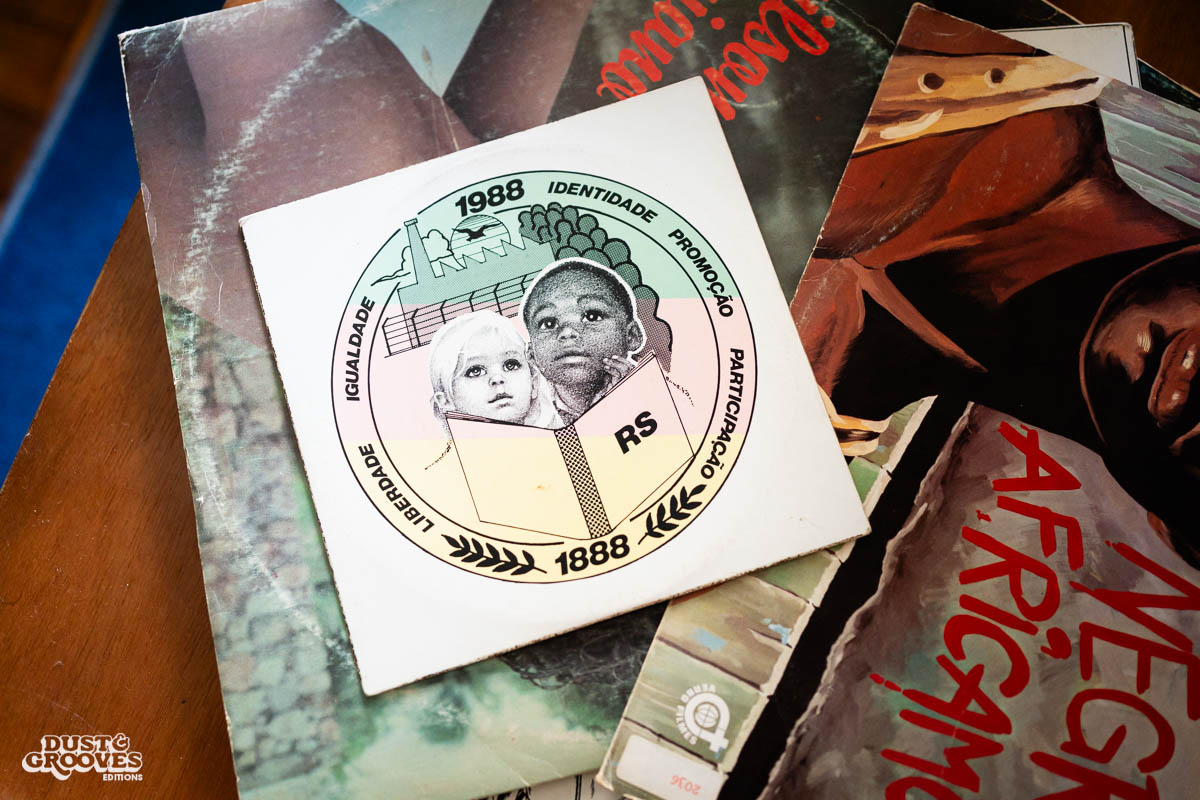
Now that you’re based in Rio, let’s talk about how you dig there. Do you spend much time digging in Rio, or are you mostly traveling to dig?
Yeah, I always go around the city! I love the city of Rio, and I love this culture of street vendors. But I also know that they do this for a living, like they’re not just doing this as a hobby. So I respect that. I don’t mind paying a fair sum for a record because I respect all the work these guys do. I’ll go to the typical places everyone knows, like Praça XV and Praça Tiradentes, but I go off into the suburbs as well, like Madureira and Pavuna. Also, it’s important to note that the city of Rio received many families that came from Bahia, and they brought a lot of stuff with them. So it’s easier for me to find music from Bahia in Rio than it is in São Paulo. I love to dig here in Rio, but my main focus is digging in the North and Northeast of the country. I go there often.
Let’s go back to the street sellers in Brazil. In the US, we’d hit the flea markets, garage sales, and thrift shops, not just passing so many street sellers. You never know where records will pop up digging in Rio. Have you found anything particularly amazing this way?
Definitely! It’s the same story. Right next to my place, there’s a supermarket, and right beside it is a guy who sells records and books on the street corner. So each time I go to the supermarket, I pass by to dig a little. One day I found this private press LP from a group I’d never heard of before called Favela. It was crazy to find it there, and it’s amazing! It’s spiritual. It’s got that concept of the “sacred and profane.” The most valuable prizes that I’ve found digging have come from guys like this. It’s because of this that I try to establish—this could be romantic on my part, but—I try to establish a relationship that is not always just based in capitalism or taking advantage. I try to be more kind, more honest, you know, like sharing the knowledge… I tell the guy, “Hey man, this record you can sell to me for a good price.” I don’t want to kill the game, but also, these guys are doing this to survive. I’m not trying to paint myself as a saint, but I do think it’s important to be conscious.
Are there any of these types of dealers in particular that you have strong relationships with?
I have a wonderful relationship with Pará, Tuí and Gil… Gil is a mastermind, an amazing guy. And there’s another one… a guy who sells records near Tiradentes. I forget his name…
Seu Wilson!
Yes, Wilson! And what is interesting about these guys is that most of them used to be DJs. This is really important. I don’t even know if they’d want to, but I think it would be beautiful if we could try to bring these guys back to play again. They have a lot of knowledge. Most of these guys used to play really funky stuff. Gil was one of the big guys, the big names back in the day. And there’s another one, Marquinhos, an amazing guy… my friend, my brother. I always try to treat those guys with a lot of respect.
“I always say pagode music taught the favela, the suburbs, to talk about love. You know, pagode was crucial. Because back in the 90s we had hip-hop showing the struggle, rhyming about the violence. But then came pagode, and pagode gave black folks the possibility to talk about love in the 'hood.'”
Gustavo Aquino Tweet
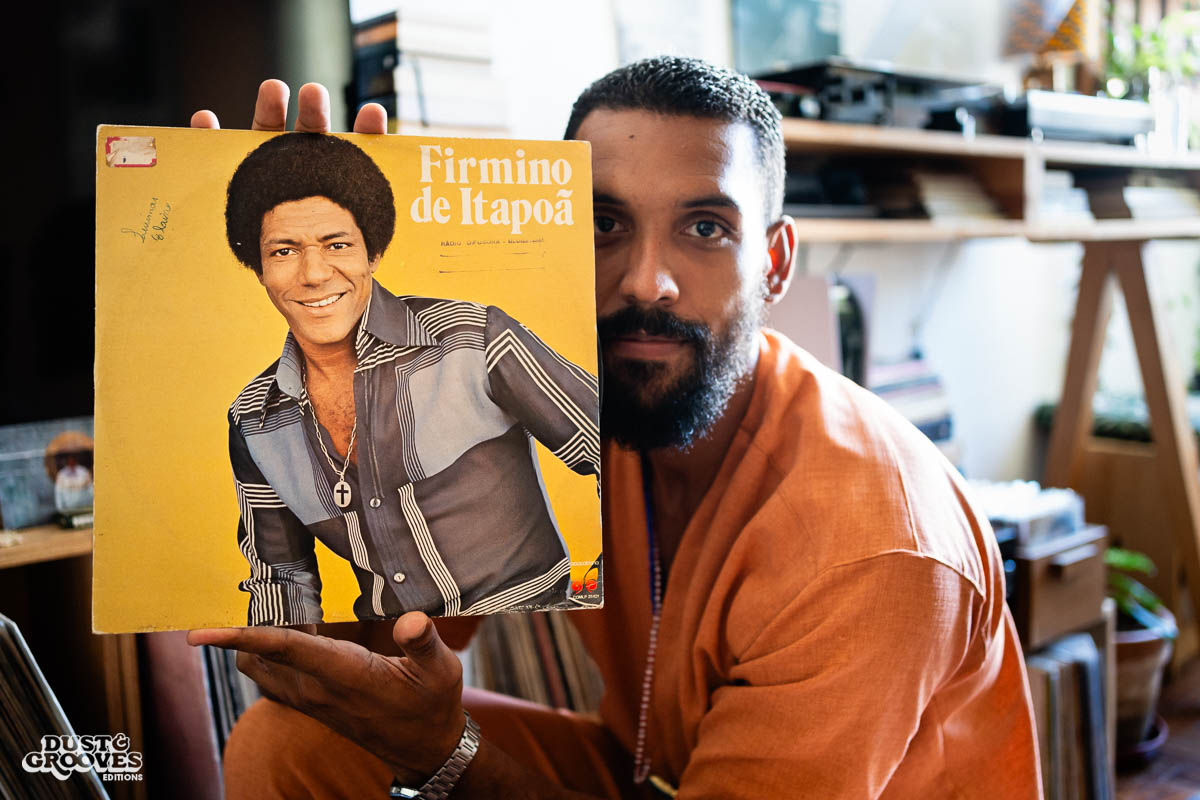
You were talking about traveling to the North and Northeast. Where are some specific places in Brazil that you’ve been traveling to in search of records recently?
I love to go to Salvador. Salvador is my place of power. It’s where I recharge myself. Although I was born in São Paulo, my whole family originally came from Salvador, and I’ve come to call it my home. I don’t live there, and I don’t face the same social struggles that exist there. But it’s my place. So, I often go to Salvador, and it’s the same situation… I have a good relationship with the sellers there. Guys like Haniel, Jorge, Pessega… I consider them my family… my grandfathers, really, because they’re getting older now. I like to go to Recife as well. Maceió too, is amazing. And Fortaleza. All of those places. I never went to Belém do Para, but I want to go because each of these places has some kind of special relationship with music. You will have in Salvador more axé oriented stuff. But there is also some reggae…
Each place has regional flavors that you’re more likely to encounter there.
Exactly! And Alagoas… it’s amazing! Shout out to Ginga Discos, who does a beautiful job uncovering music from there. They have a blend of, like, boogie with folk music there, which is amazing! The North and Northeast are a whole different universe.
How about outside of Brazil? Where have you been in search of records?
Ilê Discos, my record store, has given me the opportunity to DJ and dig in other countries. Many people who come from Europe and the US have more spending power here, so of course they will bring back a lot of stuff from Brazil. But I want to do the opposite. I want to be the Brazilian guy who goes to Europe to buy stuff and sell it here. So when I go off to Europe to play now, I do a lot of digging there, and I share all those finds on my Instagram account for Ilê Discos, telling people, “Hey guys, go to this store or that market.” I went to Budapest. I went to Paris and Marseille. Portugal. I went to Kyrgyzstan as well. Shout out to Gaz because he invited me to play at his wedding, and I was able to do some beautiful digging there.
What kind of sounds were you finding there?
They have some folk music, Kyrgyz music. It’s beautiful, very soulful, and sad in a way. Melancholic. But due to the fact that they were part of the Soviet Union, there is a lot of stuff from other countries too. Music from Kazakhstan, from Belarus. It’s more like pop music, mainly from the ‘80s, like a little bit goofy and cheesy but in a good way.
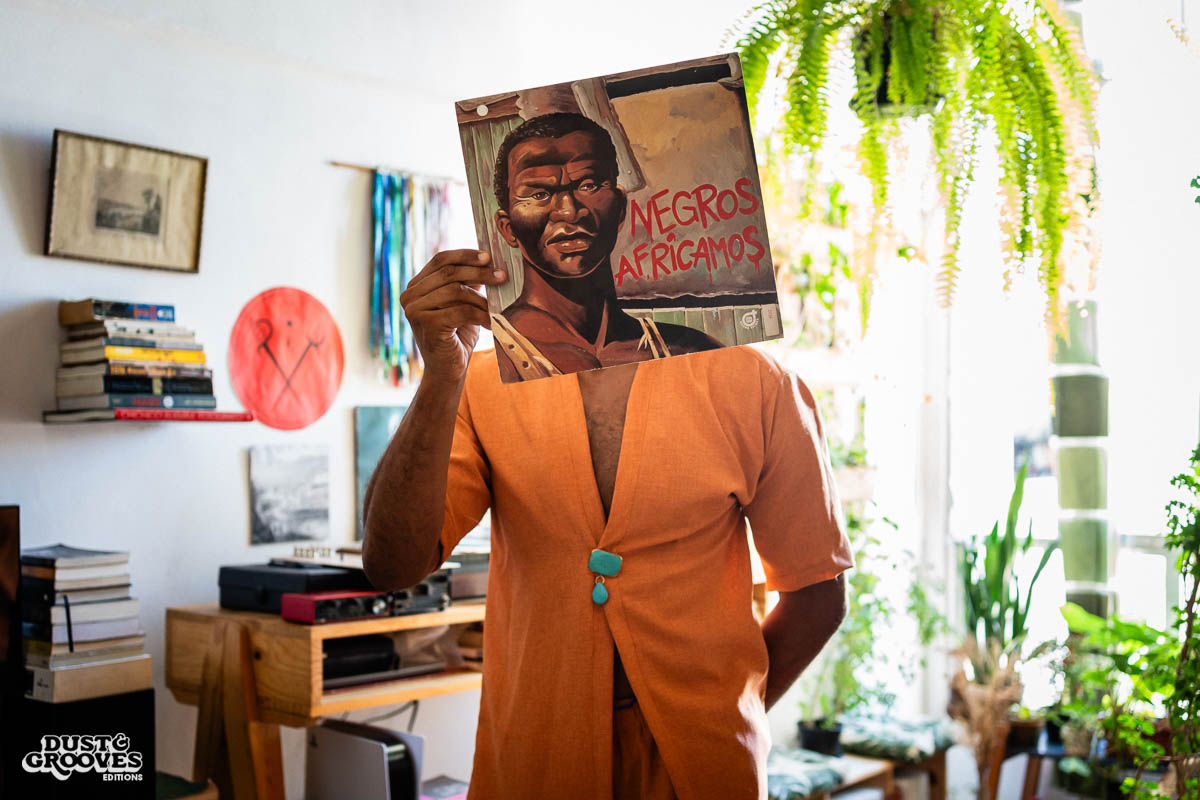
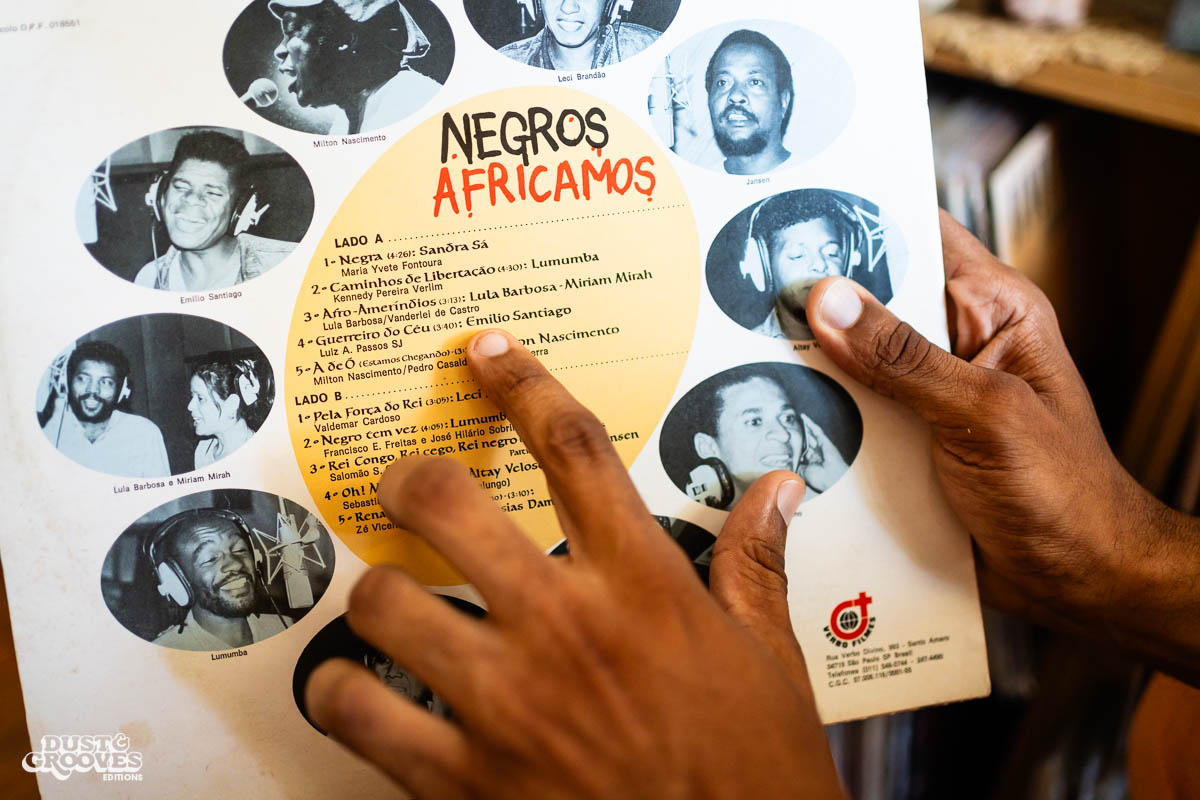
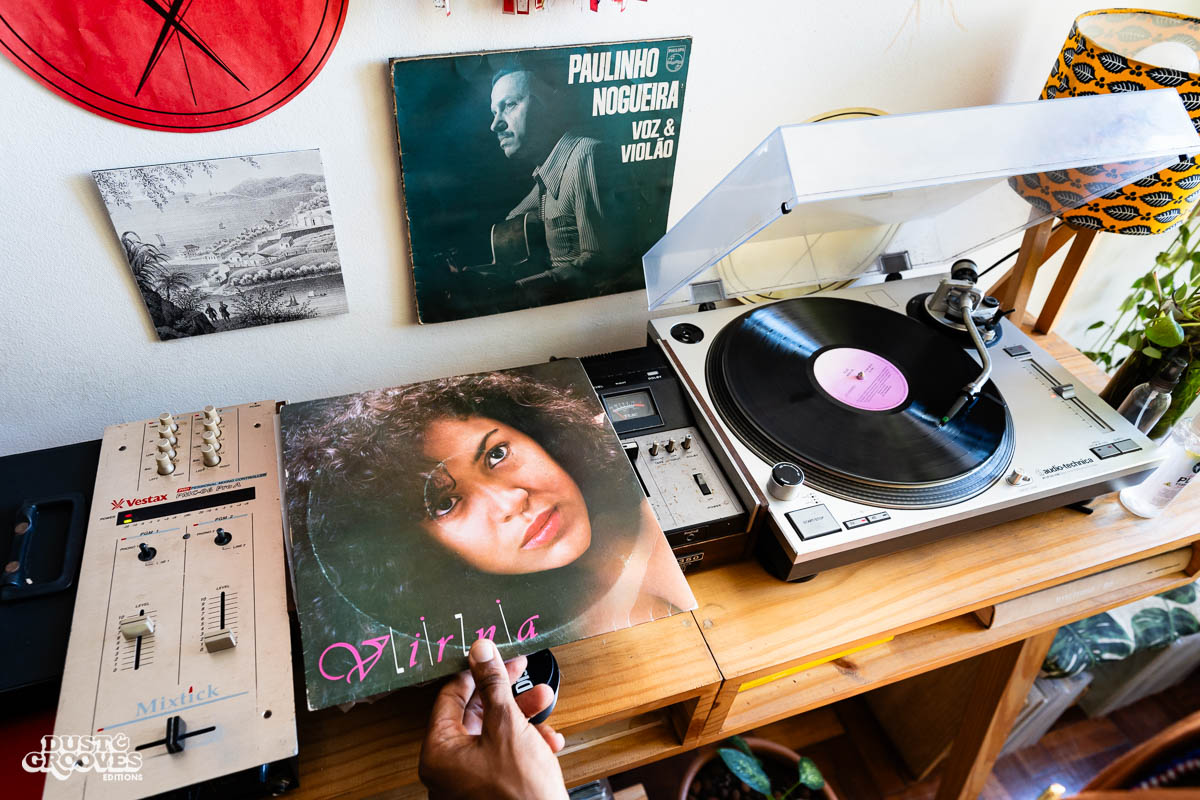
It’s cool that in your travels looking for European records to bring back, certain things have a Brazilian influence. Tell me about some places you’d love to go in the future in search of records.
I would love to go to Senegal. I’m planning to go this year to Senegal and Cabo Verde, Cuba as well. Colombia… there is a lot of influence from Nigeria, mainly in Cartagena and Barranquilla, you know, so it’s a whole kind of different universe. In my expertise, delving into the relationship between the sacred and profane, I will probably find this manifested there as well. Those are the countries at the top of my list.
With all the potential countries to visit in Africa, why have you focused on Senegal?
Senegal, for me, is really important because of Léopold Senghor, the country’s first president, who, along with Aimé Césaire and Léon Damas, created the movement Negritude. I want to see the influence that this movement had on music in Senegal. Because this movement was really important for Black people in general, you know, I want to see what kind of artists… what kind of productions the artists did with this new movement in mind…
So the album Negritude from Zezé Motta… the title was taken from this movement that originated in Senegal?
Yeah, yeah, yeah, definitely! This was a movement originated by intellectuals who mainly came from the former French colonies like Senegal and Martinique. They created this movement, Negritude.
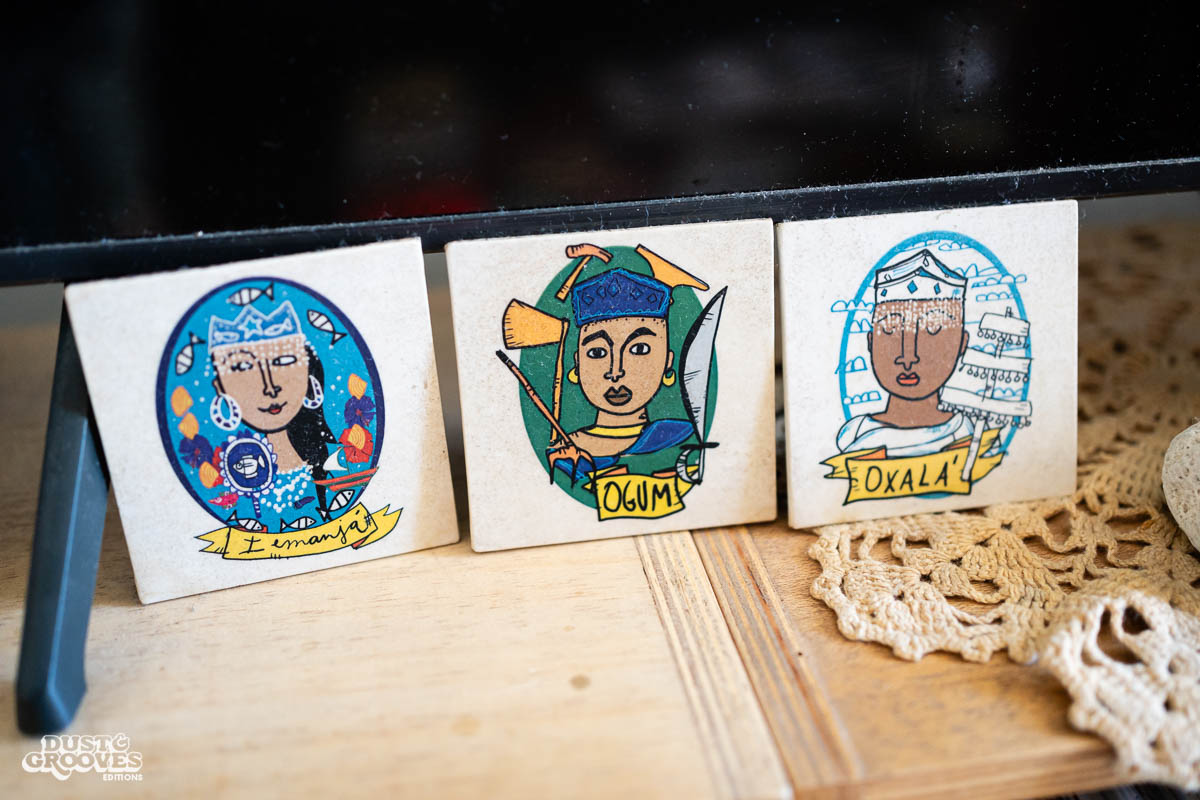
"All the music that I’m trying to find needs to have this kind of relationship with the orixás."
Gustavo Aquino Tweet
Digging in Brazil can get wild, between the characters you encounter and the places you end up in search of records. Can you share the more memorable experiences that you’ve had here chasing down records?
Oh, bro, definitely! I was in Salvador one time, and I have a good relationship with a dealer there called Jorge. One day Jorge called me and said, “Gustavo, I just bought some records from the flea market. Do you want to come over?” I was with a friend of mine, Mourad, an excellent digger, so we went there to check this stuff out. But, you know, digging is an art, and you need to be totally focused on what you’re doing. Otherwise, you will miss stuff. So, it was my last day in Salvador, and I was totally exhausted. But of course, I went down to see Jorge and to talk with him. He put this box in front of me, but I didn’t have the sense to check everything carefully, one by one. I just checked quickly. After I finished flipping through, Mourad came to have a look as well. He pulls out two copies of Paulinho de Camafeu’s incredible LP, Naja! This record is impossible to find! Camafeu passed away last year, sadly. Mourad was like, “Gustavo, there were two copies there! You didn’t see?!” Like I’m saying, digging is a discipline, right? You have to be totally focused. And of course, there are other crazy stories, like when you go to dig in a house, and the house is a crack den. It happens! Yeah, so for me, these are some of the most “Oh, my God” moments. But, in the case of the Naja record, at least Mourad was kind enough to share one copy with me.
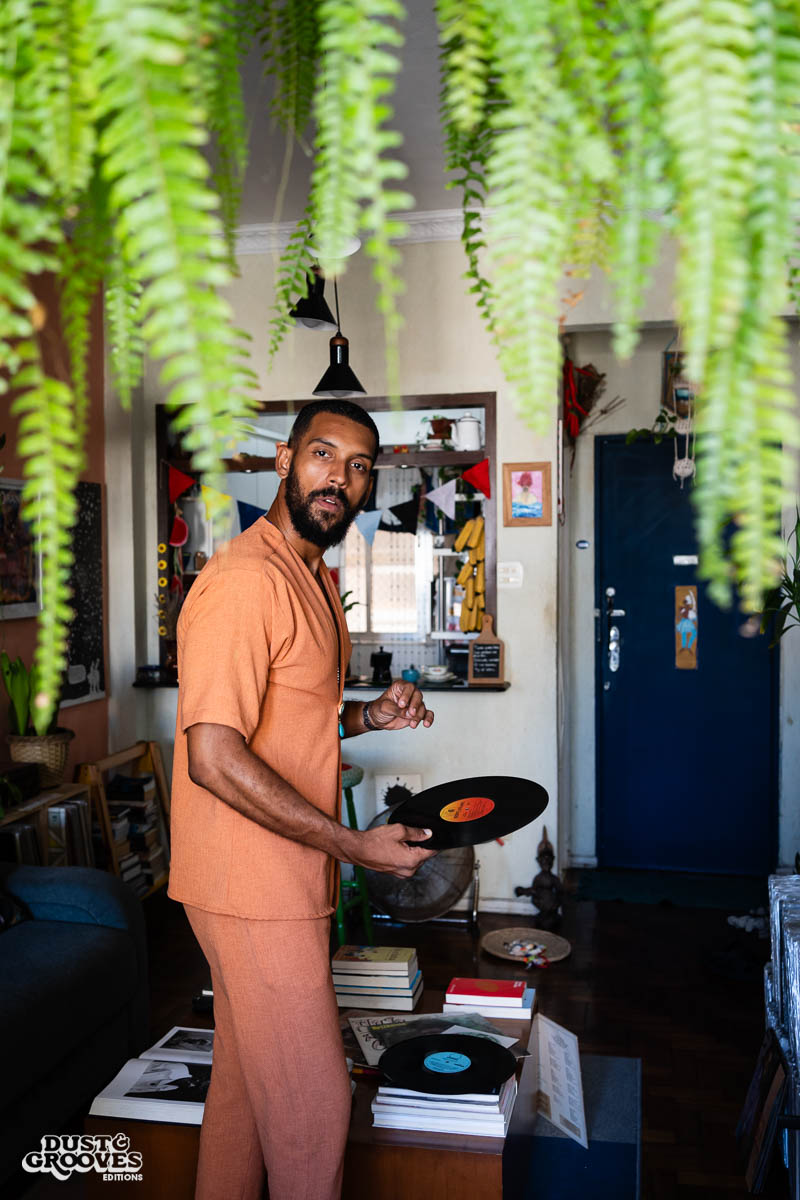
“My father is from Salvador. When I began to live alone, I missed my father, you know, so I began to collect things from Bahia to remind me of him. Bahia became the main focus in my collection.”
Gustavo Aquino Tweet
You always DJ with a book in front of you, which suggests that you’re doing more than just entertain people with your selections. What’s the connection that exists between the literature that you highlight and the records that you play?
This is a sensitive topic. Because of the violence against Black folks where I grew up, since I was a kid my father always told me, “Gustavo, if you hold a book, no one will beat you. The cops will not harass you if they think you are a student.” My father used to go to his job every day holding a book. So, every time I go to play somewhere, it’s important to bring a book with me. A book, for me, is more than culture. It is an amulet. The books that I tend to bring with me on my gigs are books that deal with African ancestry. I put this writing in front of me for everyone to see because…DJing for me is a newer thing, and I have this kind of love-and-hate relationship with it. Most of the time that I am there, I’m the only Black guy performing, and all the other Black guys there are cleaning, working security, and serving. And I play Black music for a mostly white crowd, right? I’m super grateful to everyone who’s given me an opportunity to play, but this is a problem for me, you know? So every chance that I have to confront this I will. I will bring a book. This is my political act. As you said, I’m not there just to entertain. I am there to educate, also. I want people to know that behind this music that makes you move, there is a history there!
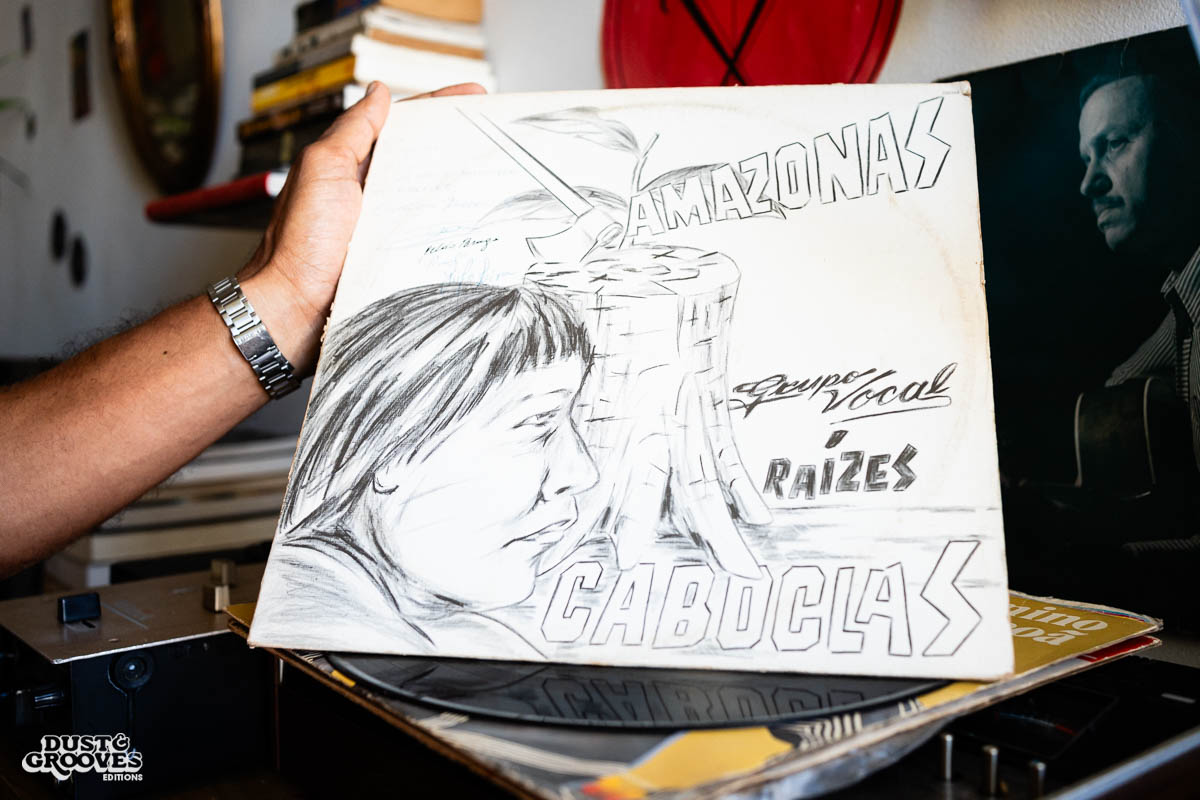
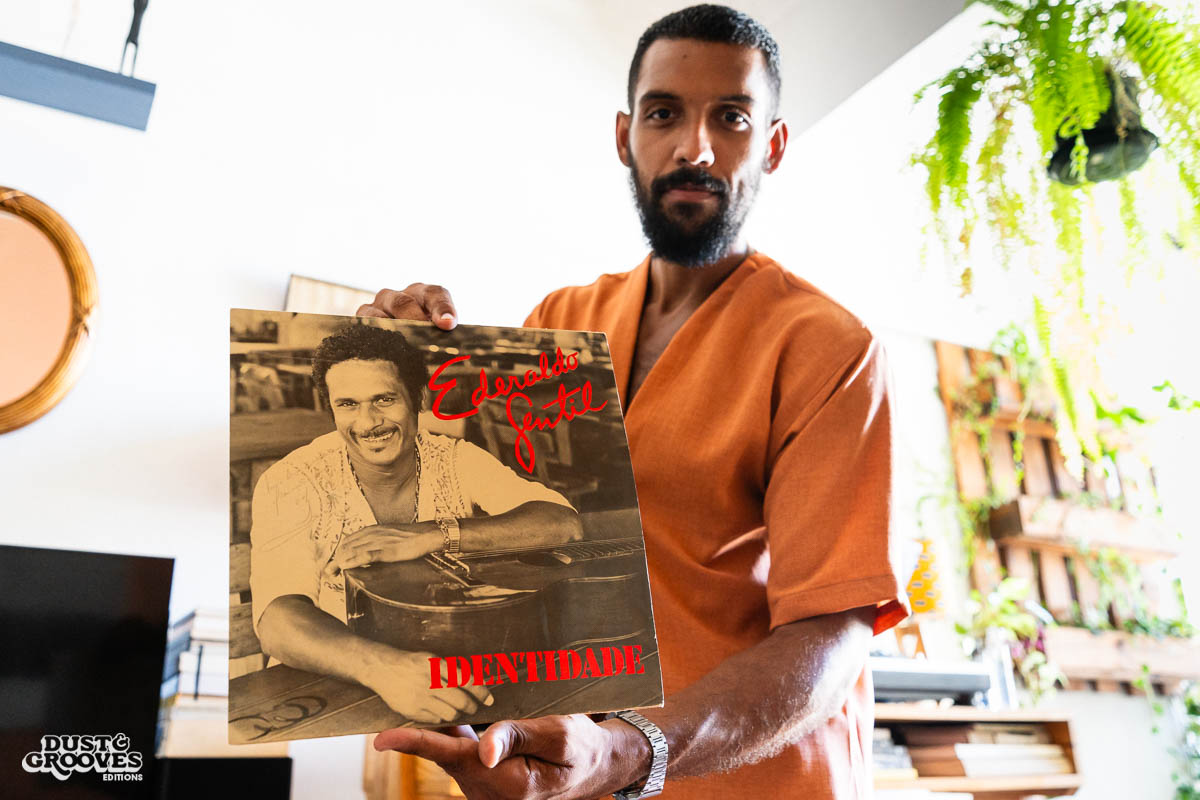
You mentioned that DJing is still new relative to your overall involvement with music and records. When I first heard you playing years ago, it was at a street fair called…
Junta Local!
But these days, I’m more likely to catch you at a Selvagem or Gop Tun party… or even our Fonq Demure party. How has it been playing these bigger events, some better known for electronic music? How do you approach these gigs?
Junta Local… thanks to Lou Cascudo and Bruno Negrão because they opened a lot of doors for me… Junta Local was like a school because you’re playing all day long for so many different types of people. It was like a lovely school for me. When I received my first invitation to play in front of a big crowd at the Gop Tun festival, it was chill. I was comfortable knowing that if I could do it at Junta Local, I could do it at Gop Tun. It was not easy, but comfortable. Fortunately, I had received a lot of counsel from some older DJs who said, “Gustavo, just be yourself,” because I was worried about what I would play. I don’t play house music. I know it was built by the Black community, by the LGBTQ+ community back in the US. But house music and disco music don’t really resonate with me like the music from my country. What I wanted to show was the Black spiritual music from my country.
Let’s talk a bit about Gustavo, the record dealer. I’ll always remember the first time I had the pleasure of visiting you at your home/shop, Ilê Discos. I knew you from your Juntos Com Certeza YouTube channel, but we’d never really hung out. You greeted me at the door, you offered me a beer, and I felt that this would be a unique experience. I left that day with amazing records, and feeling like I’d spent the afternoon with an old friend. Did you know when you began to sell records that this would be your approach?
So, I always used to get a lot of people in my place, really good friends related to music and DJs as well. And we’d spend hours talking about music and things. So I thought to myself, hey, I should just open up my house to everyone because I have a considerable pile of records here and spare copies of things. When people came over, it was natural for me. I like to receive people, to talk with people. And one reason that I can do this the way that I do is that I don’t make my living from records. This gives me the chance to be more relaxed. You can come by, and we can talk about whatever… books, records. And if you buy something, it’s good. If not, it’s good also. Like the day you came by, you gave me a lot of tips about records. This is amazing. You know, it’s not all about money. I don’t want to be a hypocrite. Money is good. It’s important, but it’s not everything.
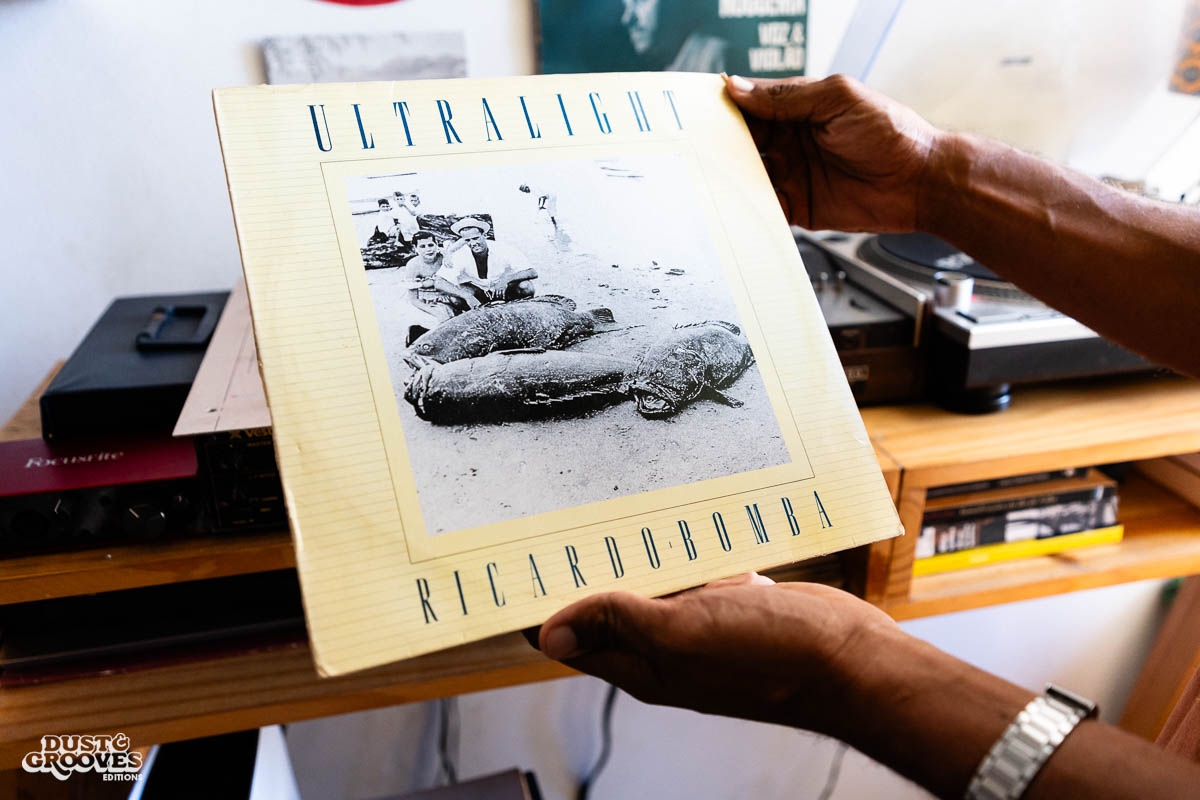
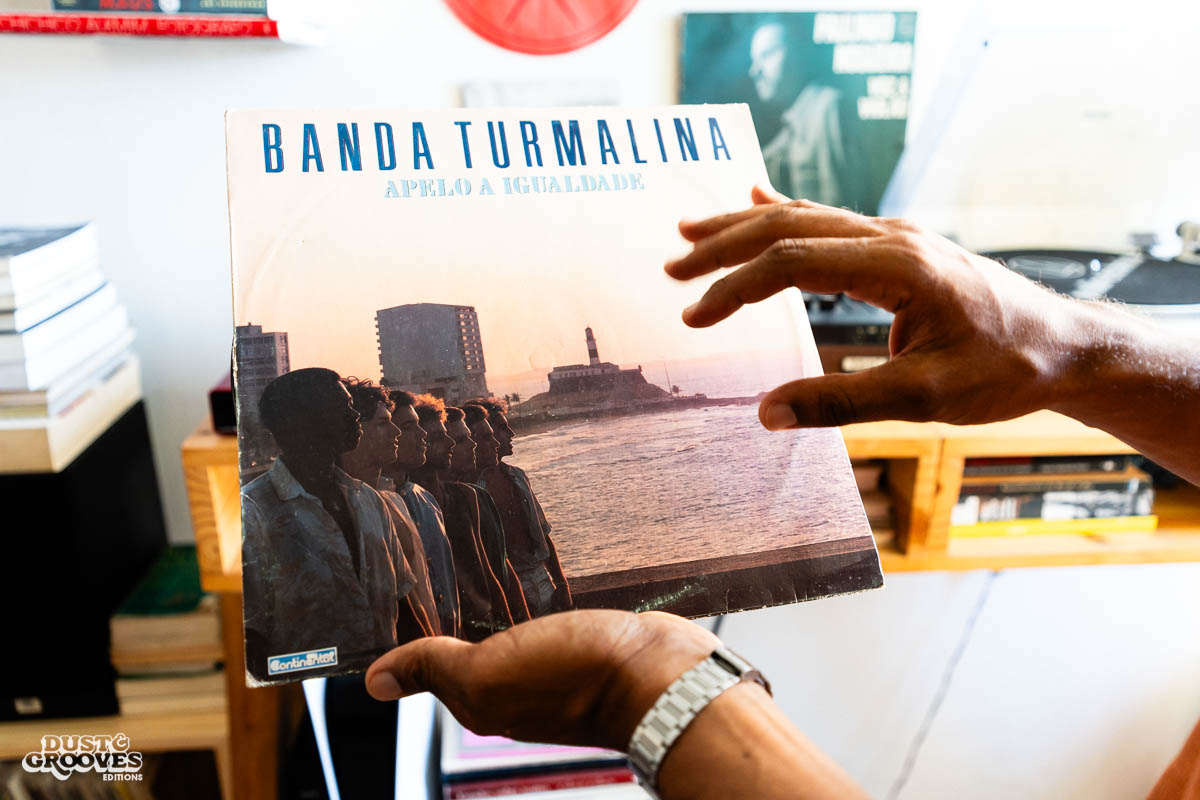
Do you find that this freedom a day job provides, translates to your DJ work?
Oh, definitely! I don’t need to compromise my style, my orientation, or my political posture because I don’t do this for a living. So, if you want to book me for a gig, cool. And if not, it’s all good too!
Do you ever find an internal conflict between being a collector and DJ, and a record dealer? Have there been any records that you’ve sold and still regret not keeping?
All the time, Tee, all the time! [laughs] But this is beautiful also. Like, I receive people from other countries, they come over, I put some records on, we talk. And then they start going through records and maybe find things that I wasn’t even aware of, like, “Oh, my God! I didn’t know that was on there!” So that’s part of the conflict. But to me, it’s great because of how this can bring about new points of research and discovery.
Where do you see yourself in five or ten years?
In the next few years, I see myself in a proper record store… a record store and bookstore… a place where I can invite people to play and to talk about literature as well, you know? This is my main focus right now. I’m trying to find a place…and trying to connect the dots while developing a new approach to DJing. Right now, I’m working on a performance where I play records but also read certain passages from books to the people. I’m trying to create something new as a DJ that speaks to my personal experience. This is what I see myself doing in the next few years.
Wow. I hope all of that happens for you. I just have one request: when you open this space, keep the nice comfortable couch and refrigerator full of cold beers.
Of course, Tee. You’re family.
·
Interview edited by Kait Venneman.
Gustavo Aquino is a selector, record collector, researcher and record dealer based in Rio De Janeiro, Brazil. Follow him on Instagram and Ile Discos.
Get the full mixtape tracklist on our Patreon page.
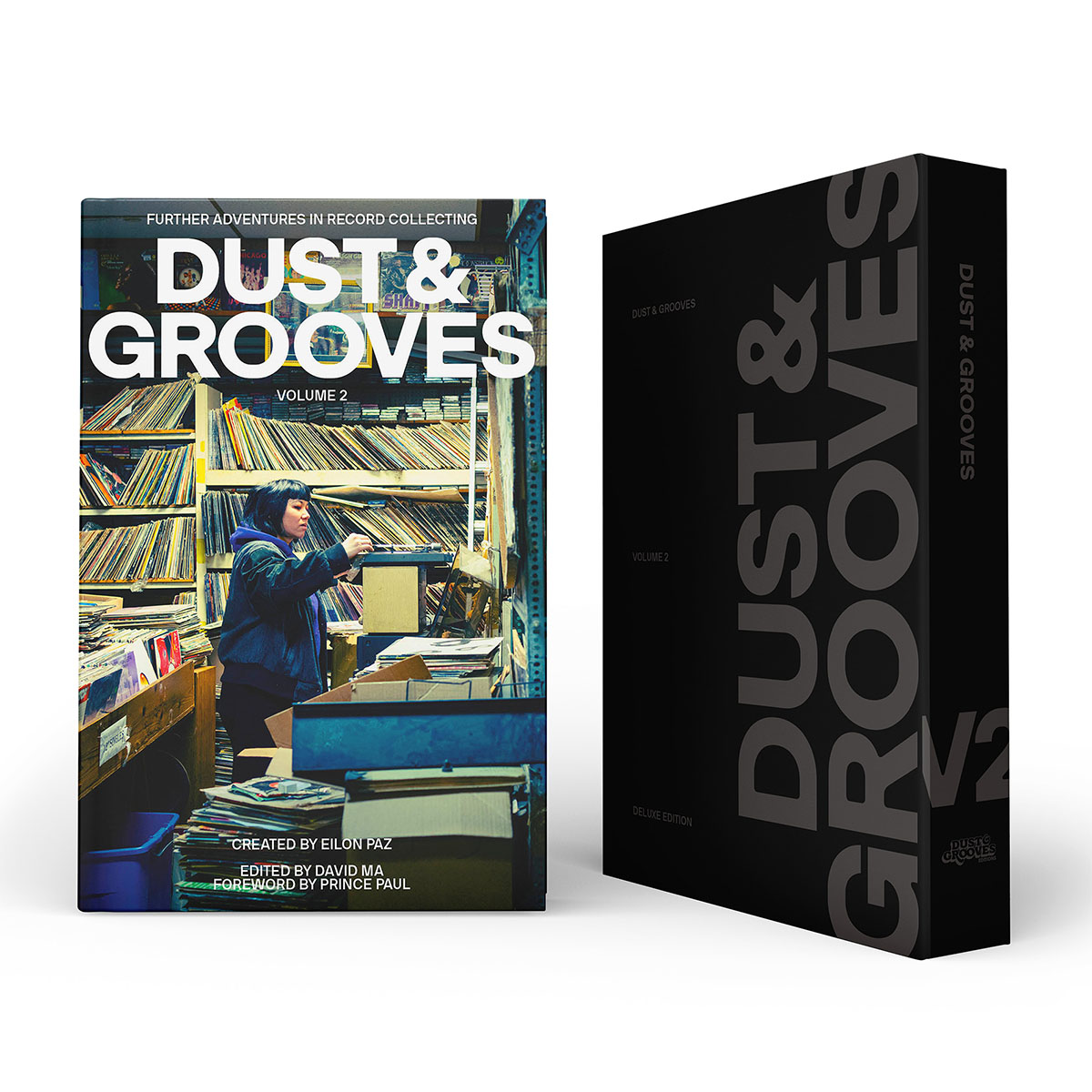
Dust & Grooves: Further Adventures in Record Collecting – Deluxe Slipcase First Limited Edition
Further Adventures in Record Collecting
Dust & Grooves Vol. 2
Gustavo Aquino and 150 other collectors are featured in the book Dust & Grooves Vol 2: Further Adventures in Record Collecting.
Book drops October 15, 2024
Become a member or make a donation
Support Dust & Grooves
Dear Dust & Groovers,
For over a decade, we’ve been dedicated to bringing you the stories, collections, and passion of vinyl record collectors from around the world. We’ve built a community that celebrates the art of record collecting and the love of music. We rely on the support of our readers and fellow music lovers like YOU!
If you enjoy our content and believe in our mission, please consider becoming a paid member or make a one time donation. Your support helps us continue to share these stories and preserve the culture we all cherish.
Thank you for being part of this incredible journey.
Groove on,
Eilon Paz and the Dust & Grooves team


